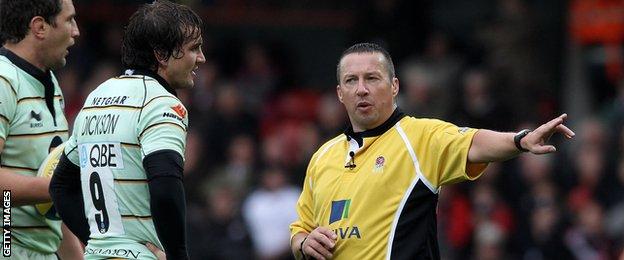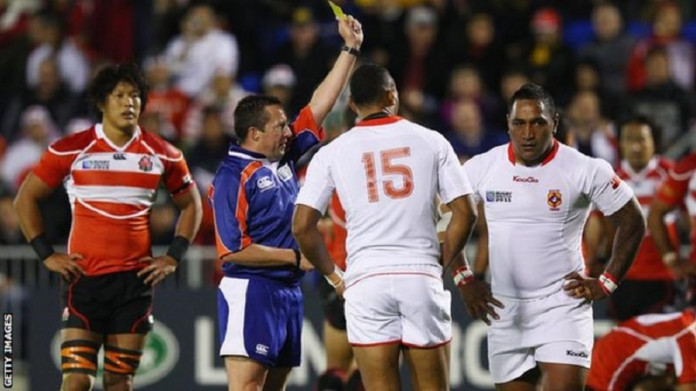Former elite referee Dave Pearson has defended World Rugby’s enhanced high tackle sanctions, saying players are in increasing need of protection from the rigours of the professional game.
The directive aims to “lower the acceptable tackle height” to help reduce the number of concussions.
Saracens director of rugby Mark McCall fears more players will face cards or suspensions due to “accidents”.
His counterparts at Ulster and Ospreys have also voiced concerns.
Contact with the head in “reckless tackles” will be penalised with at least a yellow card.
“Players get bigger over the years, creating bigger impacts,” Pearson said.
“Unfortunately the laws haven’t changed a lot. We have to be looking more and more to protect players within the current laws.”
In September 2015, World Rugby’s chief medical officer Dr Martin Raftery told the BBC laws may have to change to help reduce the number of injuries to the brain and head.
The new sanctions took effect officially from 3 January, with players at Ospreys, Scarlets and Ulster sin-binned in the Pro12 last weekend, while Saracens duo Richard Barrington and Brad Barritt have been cited for a dangerous tackle that knocked out Exeter Chiefs lock Geoff Parling.
Barrington was sent off for his role in the collision.
Pearson, who refereed 29 Tests, officiated at the 2007 and 2011 World Cups and works as the Scottish Rugby Union’s match officials high performance manager, argues officials are not seeking to punish all forms of head contact.
“We all have to realise accidents will happen on the rugby pitch,” the 50-year-old told BBC Scotland. “What we’re trying to do with these is get the guy who is targeting the player’s head.
“That’s the major message – protect the head. There will be tackles where the head contact is made – a player going in low to the ground is pretty difficult to tackle without getting contact somewhere around his upper body.
“That’s the kind of tackle that wouldn’t be targeting the player’s head. The tackles we’re after are where players are stood up and you can see the big swinging arm coming in around the upper shoulders, neck, chin, and head area.”
Players are ‘already adapting’
The application and timing of the tighter punishments have also drawn criticism, with former Wales fly-half Jonathan Davies saying inexperienced referees have “gone berserk” with their policing of the tackle.

Rugby Players Association chairman Christian Day argues the “massive” mid-season changes have come with “little education or explanation” for players, with the decisive rounds of European Champions and Challenge Cup pool fixtures coming later this month and the Six Nations Championship beginning on 4 February.
Pearson accepts the game may have to endure short-term controversies to provide its players with a safer future.
“This isn’t really new”, he said. “The directives have come out in the press recently as new, but the referees right back to November had this kind of message.
“One thing that has to be clear is they’re not really law changes, they’re just enforcing the law a bit tighter than previously. The analogy we’re using is, if you’re driving and you’re caught speeding, the speed limit’s the same – all that happens now is the fine’s a little bit more hefty.
“We’ve had November, December, and we’re halfway through January – we’ve had a fair bit of time to be able to adjust to them.
“There were a lot of examples [of players adjusting] over the weekend where rather than going in high to hit a player, one tackler goes in round the legs, another player stands off and tries to jackal the ball as soon as that player hits the floor.
“The professional players are training four or five times a week, they’ll adapt pretty quickly. I would imagine in a couple of months’ time, we’ll not be talking about this subject. We’ll have moved on to something else.”
























